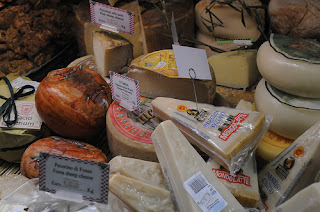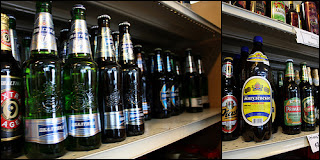But shopping in Romania took special skills and patience.
 |
| Cheese by MACSwriter, via Flickr |
There weren't supermarkets in Iași. Even in the markets that looked something like grocery stores, many items were not out on shelves where they could be handled and put into a basket while wandering down the aisles. Eggs were behind one counter. Butter and cheese behind another. Salami and sausages behind another. And purchasing anything behind the counter meant lining up first to tell the clerk which and how many of each you wanted. The clerk would then hand over a scrap of paper with something written on it which was to be taken over to the person behind the cash register where waiting in line to pay was required. Then once payment had been made, the receipt on yet another scrap of paper had to be handed back to the person behind the first counter who would then hand over the purchases.
Shopping for groceries could take a long time. And since the university was at the other end of town from the industrial zone, I often had to leave for classes too early for any shopping in the morning and then I returned after my classes, many of which were in the evening, too late to do shopping in the evening. If there hadn't been Casă Universitarilor or University House, which served meals during the lunch hour, I wouldn't have been able to eat at all. My first meal there, however, was a disappointment because I ordered ciorbă de burtă. I was told that ciorbă was a hot spicy soup, and sometimes it was, but ciorbă really just means soup. And de burtă means of tripe.
The shopping I really looked forward to was shopping for craft items, not food. Each city of any size had at least one shop that specialized in artsy crafty things. In Iași, that shop was in the center of the city, along the tramway between the industrial zone and the university. I think I even had to change trams there, but I rarely had enough time to go checking out the items in the store. And that's when I learned how important the advice to carry a pungă at all times was because it also went along with the advice to buy whatever you see that you like when you see it because it won't likely be there if you wait. I can recall seeing some lovely embroidered items - probably a table cloth and napkins - from the window of the tram. But I didn't get out and check them out. The next day, they were gone.
Another challenge when shopping for items displayed in the window is that the clerks in the stores were very reluctant to take them out of the window if someone wanted to buy them. Items on display were apparently just for that - display - to get customers into the shop, but not to be sold. I recall others telling stories of going into shops to buy books that were clearly visible behind the counter, but the clerks would insist there were none available. I guess all those behind the counter may have been special orders and I suppose it just might have been that we foreigners didn't understand Romanian well enough to figure out explanations about special orders, but it is also equally believable that the clerks didn't think we foreigners needed to know more than they told us - there were no such books available. Period.
One day I found a box in the grocery store that was labeled shrimp cakes in English. The box also had text in Chinese and probably Vietnamese. I concluded those were the other two languages on the box because the box declared in English that the contents were packed in Vietnam. The year was 1977 so seeing items from Vietnam wasn't something I expected back it the U.S. I couldn't tell from the feel of the box just what shrimp cakes were. I imagined an interior tray with compartments to hold six soft cakes. I bought a box. When I got back to my apartment, I learned from the directions that the cakes should be fried in hot oil. When I opened the box, instead of six cakes held in a divided interior tray, I found a plastic bag full of what looked like poker chips. They were white, red, orange, and yellow. And they were as hard as poker chips. After heating oil in a frying pan, I dropped about a dozen of the chips into the hot oil and discovered they all puffed up to about 4 or 5 times their original size. They had a consistency a lot like rice krispie bars, but without the melted marshmallows to hold them together. Once I realized that putting more than two or three into the pan at a time was a bad idea, I cooked up a few and ate them like popcorn.
Remember now, the instructions for these were in English, Chinese, and Vietnamese, not Romanian or even French.
The next time I took the train to Bucharest, I discovered vendors walking along beside the passenger cars offering smaller bags of these shrimp cakes for sale as a snack for travelers. Each bag appeared to have about a dozen shrimp cakes in them - but these cakes hadn't been cooked. They were still their original poker chip size and texture. I wonder how many people broke teeth when trying to eat them.
A friend, Margaret*, told me of another example of imported goods that weren't selling well. This time the items were on display in a Parfumerie where toiletries such as soaps, perfumes and cosmetics were sold. In this case the boxes on display were a pastel color and had butterflies printed on the outside. Again, the description was in English, not Romania or French. When Margaret read the box, she realized it contained contraceptives - condoms - so she bought a box just for the novelty of it. Romania had an austere program to encourage population growth through forbidding the use of contraceptives. After Margaret put a box into her shopping basket, a Romanian woman approached her and asked quietly what was in the box. Margaret explained to the best of her ability in Romanian that the contents of the box prevented babies. The Romanian woman shared this news with the other women in the store and within minutes the display was empty.
 |
| beer by La.Catholique, via Flickr |
The only other brown bottles I had seen in the market held cooking oil. In desperation, I bought four bottles of cooking oil in brown bottles, took them home and dumped the oil down the drain. I had to soak the bottles in hot soapy water to get both the labels off and the slickness from the oily contents out of the inside. With those four empty bottles, I was able to purchase another four bottles of beer. I think I settled for wine for the rest of the beverage offerings.
*a name, not necessarily the right one
No comments:
Post a Comment